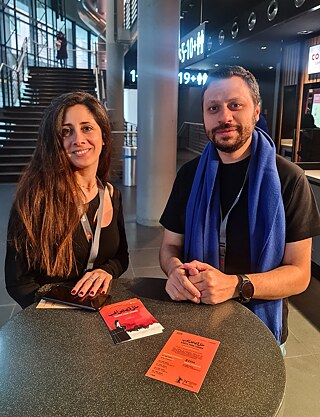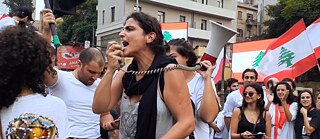The documentary "Diaries from Lebanon" by director Myriam El Hajj follows three protagonists who come from different social classes in Lebanon over several years: from an election campaign to a revolution, from a viral pandemic to the port explosion in Beirut.
Myriam El Hajj's work is shown in the Panorama section of the Berlinale. The film's Arabic title is "Like Love Stories". In English, she chose the simpler “Diaries from Lebanon.” I met with Myriam in the cinema to talk about her film.How did the long journey of “Diaries from Lebanon” begin, and how did it develop into its final form?
In my first film, Hudna (A Time to Rest), I portrayed characters whose lives were linked to the civil war, including my uncle. That gave me a focus on observing the world around me, and watching the fate of everyone who took part in the war, years after it had ended.
Now I wanted to narrate the subject in a different way. This led me to get to know Georges Moufarrej, a man who played a fundamental role in the civil war, as anyone who watches the film will find out - but a role that was never recorded, because of the lack of documentation of this pivotal stage in our history.
I started filming with George in 2018, and I felt that in parallel, a change was taking place in Lebanese society. A young generation was emerging that was practicing politics and wanted to enter parliamentary elections, to challenge the same familiar faces that have been ruling the country since the end of the war. I felt that a change was in the works that concerned the future, while I was immersed in recording the past.
This prompted me to start filming Joumana Haddad, who was mocking the political establishment by standing in the elections. She didn’t expect – actually none of us expected - that when the results were announced, she would have won against the old faces. But the next day, the authorities came back and announced that after a recount, the result had changed, and that she had lost the election she had won the day before. This was the moment when I realised that things were harder than I had imagined, and I knew I had a film to make.
But things didn’t stop there. A revolution broke out, then the pandemic, then the Beirut port explosion.
This is what’s beautiful about making a documentary, that the ideas develop as events unfold. With everything that Lebanon experienced when I was filming, between 2018 and 2022, I was trying to narrate how my generation has no alternative but to change the faces that we’re sick of. The character of Perla Joe Maalouli entered with the outbreak of the revolution, and I kept following the characters and monitoring the situation.

Director Myriam El Hajj and Berlinale blogger Ahmed Shawky | ©Ahmed Shawky
Of course, I didn’t have an answer to the question of when the film would end. I was optimistic, and I wanted an ending that would express the feelings of my generation. When the explosion happened, I almost felt like that was the end, but I didn’t want my film to finish with the death of our dreams.
I decided to stop asking myself questions, and to follow my intuition and focus on what was happening to the characters. The film became their film, to the point where they started calling me to tell me about developments in their lives that I should come and film. Making the documentary became a collective process. Then finally in 2021, I filmed a scene that I knew would be the end of the film, so that was the start of the long task of editing.
How much footage did you have?
I had more than 300 hours of footage I had taken of the characters and events. I watched the entire lot, and selected a huge amount for editor Anita Perez to watch, so we could embark on the journey of building the film. We build a storyline for each character, from beginning to end, but this wasn’t enough, because their storylines are linked to each other and to the situation in the country.
So we decided instead to tell the story in a chronological way, in which we would move between the characters so that their conversations and lives would respond to each other. That’s where it became difficult, because they weren’t just words and responses to words. The story flows organically, between everything the heroes went through and all their conflicting experiences.
I love people in general, that’s why I make documentaries. You’re talking about George, who is indeed a very difficult character (Editor's note: George is a person involved in acts of violence during the Lebanese civil war). There are stories he told that would have been impossible to include in the film. But if I couldn’t see the human being behind these stories, he couldn’t have been a character in my film.
George is a person who was used during the war. This doesn’t absolve him of responsibility for the things he did, but he is also a victim in a way. He was used during the war, and then cast aside after he lost his leg. He became poor, lost his future, and no one cared about him anymore. I understood George, because he reminded me of my family, whose story I had told in my first film. I was able to see him as a complex human being, and not just in black and white.
If you had tried to get George to change his mind, it could destroy him.
Of course, and anyway I wasn’t trying to get him to change his mind. It would be impossible for him to change it; if he did, he would be forced to commit suicide. What I’m trying to do is understand the character and what prompted him to take up arms and go to the street to shoot other citizens, out of his conviction in an idea that he was defending. By the way, the revolution was similar to George, except it was unarmed.
The three characters in the film are united by the fact that they are passionate about what they’re doing. They want to change the country for the best, as they see it, but each of them uses a different tool - legitimate in two cases and criminal in the third. If I hadn’t seen this, I wouldn’t have been able to make a movie that contains characters that I hate, or that I see as representing evil.
After everything that has happened, do you still believe that films can have an impact on this world full of injustice?
I’ll tell you a story. My sister hadn’t visited Lebanon for a very long time. Finally, she came back. When she was sitting watching television, she told me that she had worked out why the revolution had failed: the politicians were on the TV talking about a revolution that they hadn’t carried out, and analysing what the youth were doing, accusing them of being tricked by foreign embassies. The politicians won because they were able to tell the story their way, having taken away our ability to speak.
Our only tool to stop history forgetting what we lived through is to tell the story. We’re making films so that in the future, our children won’t tell us that we didn’t try to do anything.
February 2024
